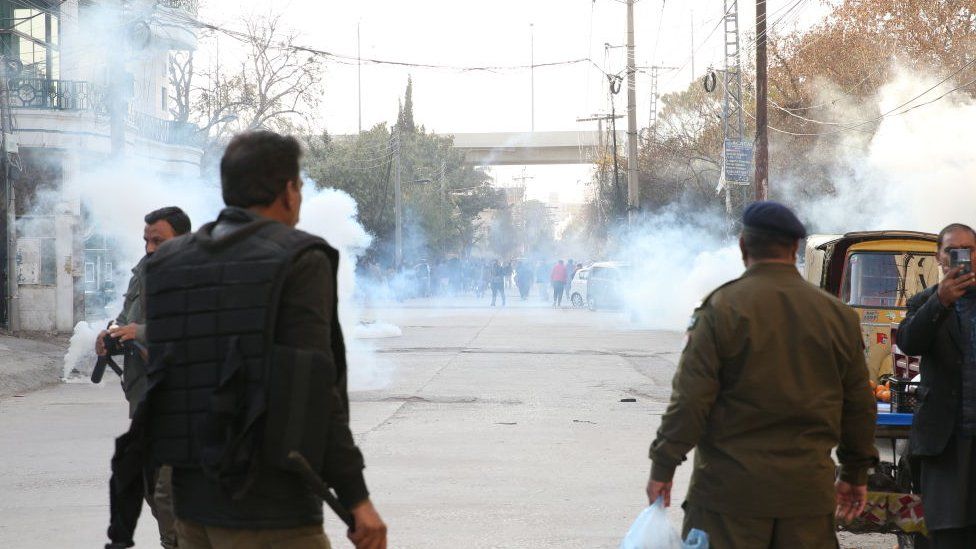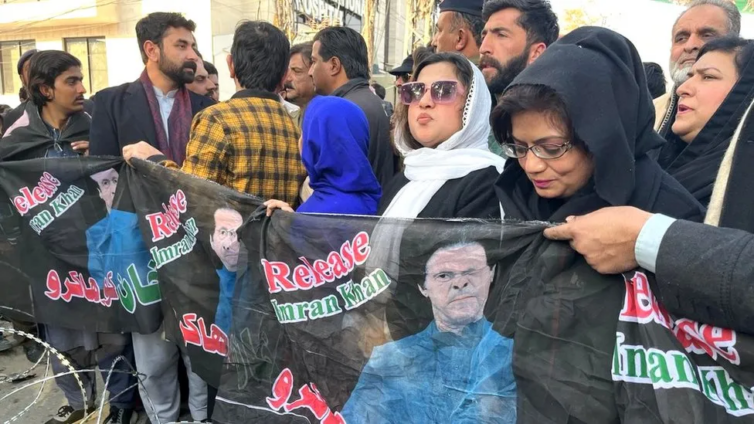The final results in Pakistan's general election have put independent candidates backed by jailed ex-PM Imran Khan's PTI party in the lead.
Independents won 101 of the National Assembly seats. BBC analysis shows 93 of them went to PTI-backed candidates.
That puts them ahead of ex-PM Nawaz Sharif's PMLN who won 75 and it is unclear who will form a government.
As wrangling continues, independent candidates who did not win have flooded courts with vote-rigging allegations.
Both the PTI, which was blocked from taking part in the election, and Mr Sharif's PMLN say they want to form the next government.
The result was a surprise as most observers had expected Mr Sharif's party - widely seen as having the powerful military's backing - to win, given Mr Khan had been jailed on charges ranging from corruption to having married illegally and his party was barred from the ballot sheet.
To govern, a candidate has to show they are at the head of a coalition with a simple majority of 169 seats in the National Assembly.
Nawaz Sharif's PMLN has said that it has started formal discussions with Bilawal Bhutto Zardari's PPP about forming a government. In a statement released by the PMLN the party said: "The leaders agreed to cooperate politically to bring the country to political stability."The two parties formed an alliance to oust Mr Khan, from power in 2022 and ruled until last August.
The Karachi-based MQM party has also made a surprising return in the polls, winning 17 seats, and could play a role in any coalition.
Of the National Assembly's 366 seats, 266 are decided by direct voting and 70 are reserved - 60 for women and 10 for non-Muslims - and these are allocated according to the strength of each party in the assembly.
Under Pakistan's rules, independent candidates are not eligible to be allocated reserved seats in parliament.
The PTI, among several other parties, has called for protests against the results, alleging they have been rigged.
On Sunday, police blocked streets near the electoral commission building in the city of Rawalpindi with barbed wire and large trucks, preventing any protestors from accessing it.
For about 90 minutes, a crowd of a few hundred protestors chanted on the street. Then the atmosphere turned. Police used several rounds of teargas to disperse the crowd, which then left the area.
The Punjab police told the BBC that there was a section 144 in place - a colonial-era law that stopped a gathering of more than four people.
This restriction had been put in place before the election until 12 February, but it detailed that civilians were not allowed to carry firearms, not that they were prevented from gathering.
Police in Islamabad said action would be taken against demonstrators.

GETTY IMAGES
The PTI's chairman had called for peaceful protests outside electoral commission offices where they were concerned about "forged" results.
Pakistani media reported that the PTI party claimed that the results of at least 18 National Assembly seats were "falsely changed" by election officers.
On Saturday, Mr Sharif - who is thought to be favoured by the military - called for other parties to help him form a unity government.
As negotiations got under way between Mr Khan's political rivals, experts have warned Pakistan could be facing a "prolonged period of political instability".
Dr Farzana Shaikh from the Chatham House think tank told the BBC that the Khan-linked independents were unlikely to be allowed to form a government and many people feared a "weak and unstable coalition" would result from any tie-up between Mr Sharif and the PPP.
Meanwhile, at least six PTI-backed candidates who did not win their seats have lodged legal challenges in the courts to try to get the outcome overturned.
Among them is Yasmin Rashid, who stood against Mr Sharif in Lahore. The petitioners allege collusion in the alteration of election results on specific forms.
Pakistani officials have denied any irregularities. The PMLN has also reportedly formed a legal team to address rigging allegations.
Latest Stories
-
Ofori-Atta unable to appear before OSP on June 2 due to health reasons – Frank Davies
36 minutes -
Conservative historian wins Polish presidential vote
1 hour -
GoldBod can stabilise cedi if we get it right, says Association of Banks CEO, John Awuah
1 hour -
Man arrested in Western Region for illegal firearm possession
2 hours -
Football and other premium TV being pirated at ‘industrial scale’
2 hours -
Tanzanian politician’s lawyers ask UN to declare his detention arbitrary
2 hours -
Nigeria detains soldiers, police over weapons sales to armed groups
2 hours -
Ghana gold output could rise 6.25% to 5.1 million ounces in 2025
3 hours -
French Open scheduling pleas ‘like hitting head against wall’
3 hours -
US court won’t lift judge’s block on Trump’s government overhaul
3 hours -
‘Angry’ Alcaraz beats Shelton to reach quarters
3 hours -
Spurs to complete £21m Danso signing
3 hours -
Manchester United second most valuable club despite struggles
3 hours -
MANSTECH stun Mfantsipim to clinch soccer glory
4 hours -
Inter want Inzaghi to stay despite record final defeat
5 hours

